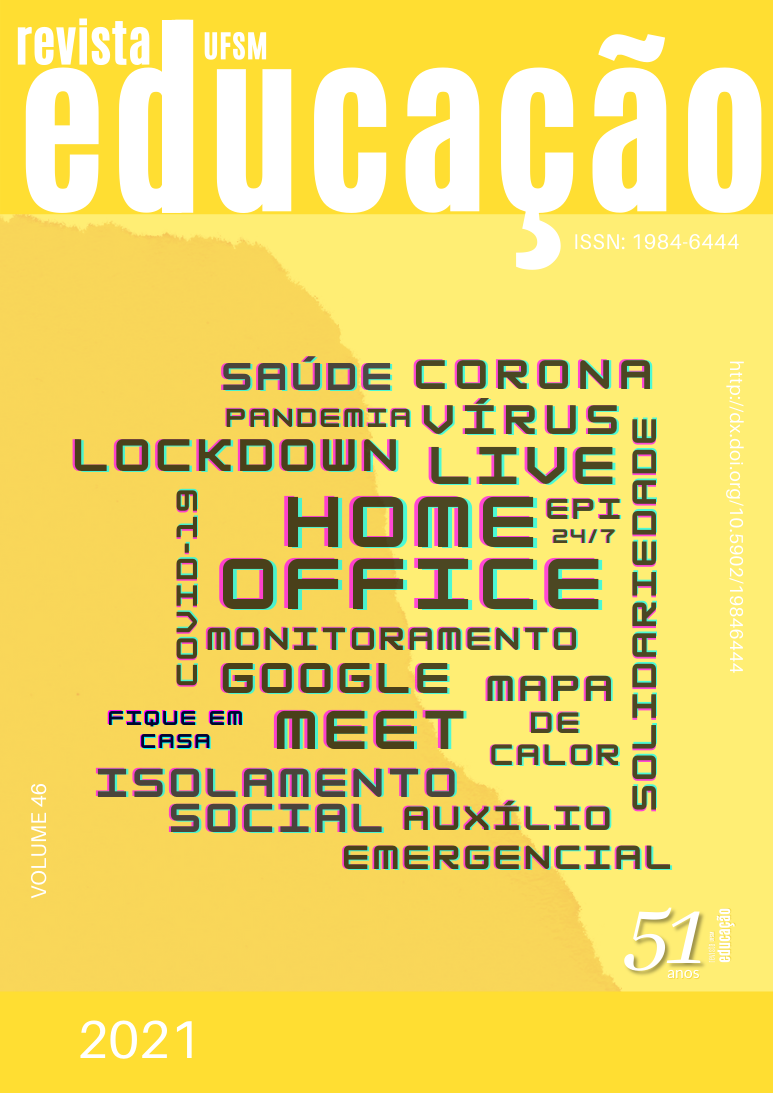Contemporary feminisms: mediations and powers of feminist and transfeminist cyberactivism
DOI:
https://doi.org/10.5902/1984644446906Keywords:
Feminismos, Gênero, Ciberativismo feminista.Abstract
The study aimed to reflect on the contemporary expressions of feminisms, demarcating mediations and potencies of feminist and transfeminist cyberactivism. It approached feminist thought as a historical, political and philosophical-epistemological movement and the “waves” of feminism; discussed the networks of feminist and transfeminist cyberactivism; exposed the portrait of research on feminism and transfeminism in Brazil between 2015 and 2019; and presented the expressions of feminist and transfeminist cyberactivisms. Feminist research was configured in the theoretical-methodological and praxis character, with the perspective of strengthening the theory/practice and University/society relationship; qualitative bibliographic and documentary type; referenced in critical theories of feminism, transfeminism and marxism. An online search was used: on the Capes Portal by the descriptors feminism, transfeminism, feminist cyberactivism, filtered by the Communication and Information Assessment Area; Education; and Social Service, with 324 surveys; on Facebook, Instagram and Twitter social networks with the terms March, Feminist and Transfeminist Collective, Feminist and Transfeminist Front, locating 438 pages. The new “wave” of contemporary feminisms drives new redesigns of theoretical premises and feminist and transfeminist movements, structured in intersectional, transversal and transdisciplinary boundaries of gender, race, sexuality, class, generation, territoriality, among other markers. Academic productions point to the appropriation of theories as a subsidy for social, political and educational practices; and strengthening of feminist and transfeminist epistemologies, the claiming agendas of feminisms and transfeminisms, and the resulting transformations. Feminist and transfeminist cyberactivism intensifies the organization, mobilization and resistance of women, culminating in greater diversity and power of the uprisings on the networks and in the streets.
References
ARRUZZA, Cinzia; BHATTACHARYA, Tithi; FRASER, Nancy. Feminismo para os 99%: um manifesto. Tradução Heci Regina Candiani. 1. ed. São Paulo: Boitempo, 2019.
CASTELLS, Manuel. A sociedade em rede. São Paulo: Paz e Terra, 1999.
COSTA, Claudia de Lima. O sujeito no feminismo: revisitando os debates. Cadernos Pagu, Campinas. UNICAMP, v. 19, p. 59-90, 2002. Disponível em: https://www.scielo.br/pdf/cpa/n19/n19a04.pdf. Acesso em: 19 mar. 2020.
CRENSHAW, Kimberlé. Documento para o encontro de especialistas em aspectos da discriminação racial relativos ao gênero. Estudos Feministas, Florianópolis, v. 10, n. 1, p. 171-188, 1º sem., 2002. Disponível em: https://www.scielo.br/pdf/ref/v10n1/11636.pdf. Acesso em: 11 mar. 2020.
CRUZ, Maria Helena Santana. A crítica feminista à ciência e contribuição à pesquisa nas ciências humanas. Revista de Estudos de Cultura da UFS. 2014, p. 15-27. Disponível em: http://www.seer.ufs.br/index.php/revtee/article/viewFile/2949/2596. Acesso em: 11 jan. 2020.
CRUZ, Maria Helena Santana; DIAS, Alfrancio Ferreira. Antifeminismo. Revista de Estudos de Cultura, n. 1, Jan/Abr, 2015, p. 33-42. Disponível em: https://trapiche.revistas.ufs.br/index.php/revec/article/view/3651. Acesso em: 5 jun. 2019.
DOMINGUES, José Maurício. Aproximações à América Latina: desafios contemporâneos. Rio de Janeiro: Civilização Brasileira, 2007.
HARAWAY, Donna. Manifesto ciborgue: ciência, tecnologia e feminismo-socialista no final do século XX. In: HARAWAY, Donna; KUNZRU, Hari; TADEU, Tomaz (Orgs.). Antropologia do ciborgue: as vertigens do pós-humano. Belo Horizonte: Autêntica, 2000. p. 33-118.
HARDING, Sandra. A instabilidade das categorias analíticas na teoria feminista. Estudos Feministas, Florianópolis, v. 1, n. 1, p. 7-31, 1993. Disponível em: https://periodicos.ufsc.br/index.php/ref/article/view/15984/14483. Acesso em: 17 nov. 2019.
LOURO, Guacira Lopes. Gênero, história e educação: construção e reconstrução. Educação e Realidade, Faculdade de Educação da Universidade Federal do Rio Grande do Sul, v. 20, n. 2, p. 101-132, 1995. Disponível em: https://seer.ufrgs.br/educacaoerealidade/article/view/71722. Acesso em: 13 fev. 2020.
LOURO, Guacira Lopes. Gênero, sexualidade e educação: uma perspectiva pós-estruturalista. Petrópolis: Vozes, 1999.
MARX, Karl. O capital: crítica da economia política. Rio de Janeiro: Civilização Brasileira, 1975.
MATOS, Marlise. Movimento e teoria feminista: é possível reconstruir a teoria feminista a partir do Sul Global? Revista de Sociologia e Política, v. 18, n. 36, jun., 2010, p. 67-92. Disponível em: https://www.scielo.br/pdf/rsocp/v18n36/06.pdf. Acesso em: 3 mai. 2020.
PRÁ, Jussara Reis. O feminismo como teoria e como prática. In: STREY, Marlene Neves. (Org.). Mulher: Estudos de gênero. São Leopoldo: UNISINOS, p. 39-57, 1997.
PEDRO, Joana Maria. O feminismo de "segunda onda". Corpo, Prazer e Trabalho. In: PINSKY, Carla Bassanezi; PEDRO, Joana Maria (Orgs.). Nova história das mulheres no Brasil. São Paulo: Contexto, 2012, p. 238-259.
PINTO, Céli Regina Jardim. Uma história do feminismo no Brasil. (Coleção História do Povo Brasileiro). São Paulo: Editora Fundação Perseu Abramo, 2003.
RAGO, Margareth. Entre a história e a liberdade: Luce Fabbri e o anarquismo contemporâneo. São Paulo: Editora UNESP, 2001.
SAFFIOTI, Heleieth Iara Bongiovani. Gênero, patriarcado e violência. São Paulo: Perseu Abramo, 2004.
SCOTT, Joan Wallach. Gender: A useful category of historical analysis. The American Historical Review, 91(5), p. 1053-1101, 1986.
SCOTT, Joan Wallach. Gênero: uma categoria útil de análise histórica. In: Educação & Realidade, Porto Alegre: Vozes, v. 16, n. 2, p. 5-22, jul/dez, 1990. Disponível em: https://seer.ufrgs.br/index.php/educacaoerealidade/article/view/71721. Acesso em: 13 fev. 2020.
SWAIN, Tânia Navarro. Feminismo e representações sociais. In: História: Questões & Debates, Curitiba: Editora da UFPR, n. 34, p. 11-44, 2001.
Published
How to Cite
Issue
Section
License
Declaration of originality
We declare that all articles present in the journal Educação (UFSM) are originals and were not submitted for publishing on any other publication, as a whole or a fraction. We also declare that, after being published by Educação (UFSM), a paper will not be submitted to another journal within two years. After this time, our journal transfers the publishing rights to the authors, with a permit granted by the Editorial Council.
We also acknowledge that the originals’ submission to Educação (UFSM) implies on a transference of copyright for physical and digital publishing to the journal. In case of noncompliance, the violator will receive sanctions and penalties predicted by the Brazilian Copyright Protection Law (n. 9610, dated 19/02/98).
Attribution 4.0 International (CC BY 4.0)
This license lets others remix, transform, and build upon the material for any purpose, even commercially, and copy and redistribute the material in any medium or format.

This work is licensed under a Creative Commons Attribution 4.0 International (CC BY 4.0)






